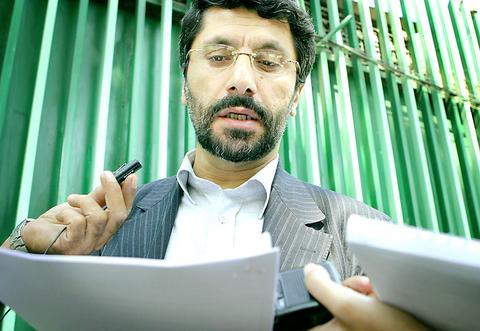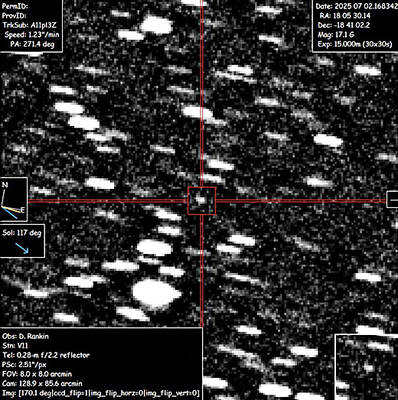A court has acquitted an agent charged with the killing of an Iranian-Canadian photojournalist in a case that has damaged relations between Ottawa and Tehran, the lawyer and Nobel Peace laureate representing the victim's mother said.
The Tehran court on Saturday cleared Mohammad Reza Aghdam Ahmadi, the sole defendant in the case, of killing Zahra Kazemi, who died of a fractured skull and brain hemorrhage in detention in July last year, Shirin Ebadi said.
Ebadi said the legal proceedings were flawed and threatened to take the matter to international organizations.

PHOTO: REUTERS
"I'm required to work until my last breath to make sure that justice is done to my client," Ebadi said. "I'll protest this verdict. If the appeals court and other legal stages fail to heed our objections, we will use all domestic and international facilities to meet the legal rights of my client."
Kazemi, a Canadian freelance journalist of Iranian origin, died in detention on July 10 last year after taking photographs outside a Tehran prison during student-led protests against the ruling theocracy.
Iranian authorities initially said Kazemi died of a stroke but a presidential committee later found she died of a fractured skull and brain hemorrhage.
Ahmadi pleaded innocent on July 17 and the trial was abruptly ended the next day.
Hardliners were angered when the defense team led by Ebadi accused prison official Mohammad Bakhshi of inflicting the fatal blow to Kazemi and the conservative judiciary of illegally detaining her.
Ebadi, who leads a four-member legal team, accused the court of deliberately failing to carry out justice.
"If the court had summoned the people we named during the trial for explanation, it could have accurately identified the people who committed the murder," she said.
Ebadi refused to sign the bill of indictment -- which implicated Ahmadi and cleared Bakhshi of any wrongdoing -- and demanded that the court summon several top officials, including hardline Tehran Prosecutor Saeed Mortazavi, to explain Kazemi's death.
Ebadi said filing a case against Bakhshi still remained an option before she would turn to international organizations.
Iran-Canada relations, soured by the slaying and subsequent burial in Iran against the wishes of Kazemi's son in Canada, further deteriorated after Iran rejected the idea of Canadian observers attending the trial. Relations were further strained when the Canadian ambassador was not allowed to attend the last session of the open trial last Sunday.
Canadian foreign affairs spokesman Andre Lemay declined comment on the verdict, saying he didn't have information on the reasons for acquittal, since Canadian observers were excluded from the court and received no official information.
"We don't understand the reasons for the acquittal. Lack of proof? Is this a mistrial? Are they going to set a new trial next week, in a month's time? We don't have any of those details. We're scrambling to find out as much as we can," he said.
Ebadi said the court also ruled that Kazemi's blood money will be paid from public, or government, funds. Blood money is the compensation that an Islamic court orders a convicted attacker to pay to the victim or the victim's relatives. In Kazemi's case, the money has to be paid from public funds since no murderer has been identified.
John Terry, a lawyer for Kazemi's son, Stephan Hachemi, said the family would reject any financial compensation.
"The family has reiterated that it will not be accepting any blood money," Terry said in Toronto. "[The family] views the whole provision of blood money here and the amount of it as a humiliating and insulting gesture."
Hachemi said the acquittal and the blood money offer were Iran's attempt to make the case go away.
"The Iranian judiciary, through this acquittal and through its offer of blood money, is telling the world that the Zahra Kazemi case is now closed. No way," Hachemi said.
Terry also said the verdict did not address the repatriation of Kazemi's body.

Two former Chilean ministers are among four candidates competing this weekend for the presidential nomination of the left ahead of November elections dominated by rising levels of violent crime. More than 15 million voters are eligible to choose today between former minister of labor Jeannette Jara, former minister of the interior Carolina Toha and two members of parliament, Gonzalo Winter and Jaime Mulet, to represent the left against a resurgent right. The primary is open to members of the parties within Chilean President Gabriel Boric’s ruling left-wing coalition and other voters who are not affiliated with specific parties. A recent poll by the

TENSIONS HIGH: For more than half a year, students have organized protests around the country, while the Serbian presaident said they are part of a foreign plot About 140,000 protesters rallied in Belgrade, the largest turnout over the past few months, as student-led demonstrations mount pressure on the populist government to call early elections. The rally was one of the largest in more than half a year student-led actions, which began in November last year after the roof of a train station collapsed in the northern city of Novi Sad, killing 16 people — a tragedy widely blamed on entrenched corruption. On Saturday, a sea of protesters filled Belgrade’s largest square and poured into several surrounding streets. The independent protest monitor Archive of Public Gatherings estimated the

Irish-language rap group Kneecap on Saturday gave an impassioned performance for tens of thousands of fans at the Glastonbury Festival despite criticism by British politicians and a terror charge for one of the trio. Liam Og O hAnnaidh, who performs under the stage name Mo Chara, has been charged under the UK’s Terrorism Act with supporting a proscribed organization for allegedly waving a Hezbollah flag at a concert in London in November last year. The rapper, who was charged under the anglicized version of his name, Liam O’Hanna, is on unconditional bail before a further court hearing in August. “Glastonbury,

FLYBY: The object, appears to be traveling more than 60 kilometers per second, meaning it is not bound by the sun’s orbit, astronomers studying 3I/Atlas said Astronomers on Wednesday confirmed the discovery of an interstellar object racing through the solar system — only the third-ever spotted, although scientists suspect many more might slip past unnoticed. The visitor from the stars, designated 3I/Atlas, is likely the largest yet detected, and has been classified as a comet, or cosmic snowball. “It looks kind of fuzzy,” said Peter Veres, an astronomer with the International Astronomical Union’s Minor Planet Center, which was responsible for the official confirmation. “It seems that there is some gas around it, and I think one or two telescopes reported a very short tail.” Originally known as A11pl3Z before